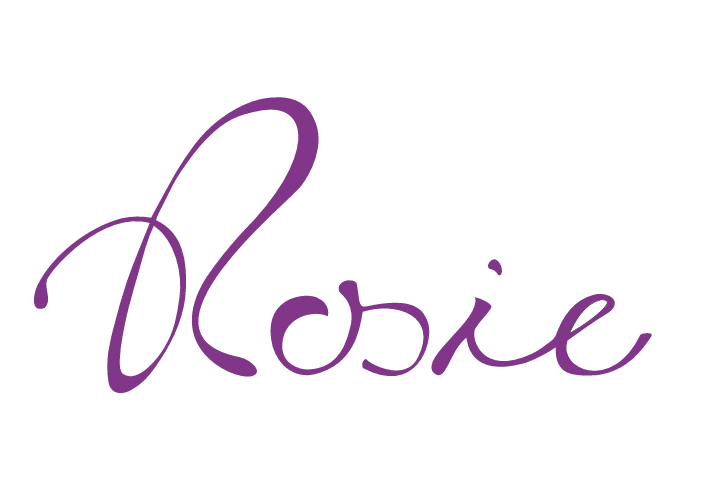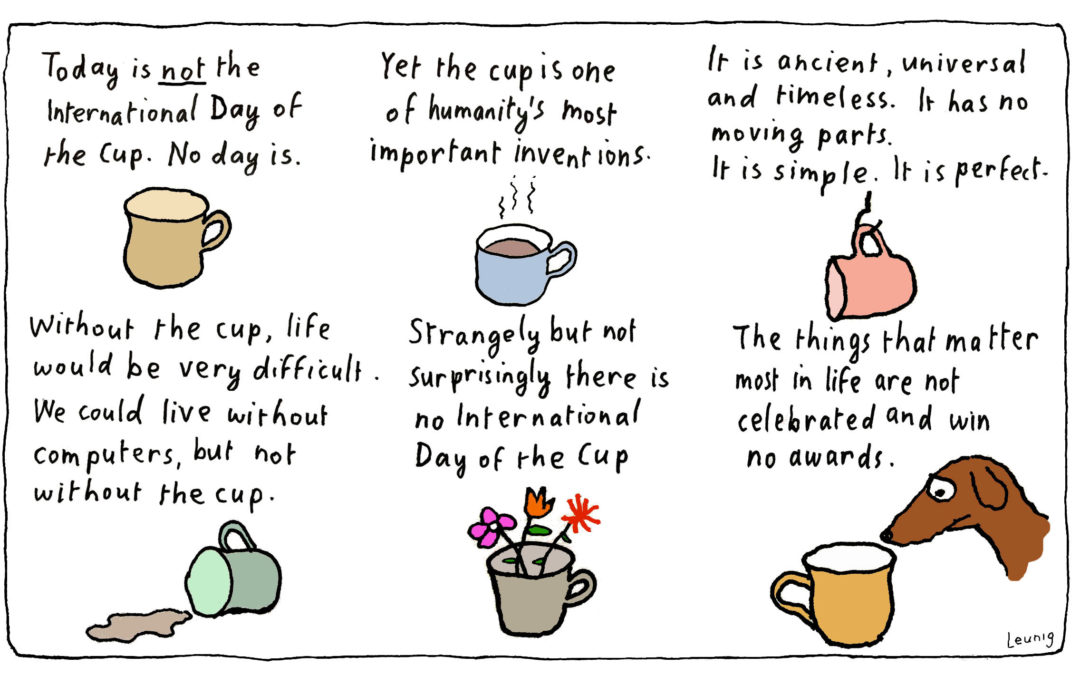Michael Leunig is a national treasure. A few strokes of his uniquely wielded brush, some spare and scruffy words… and suddenly a gentle ‘hey presto’ appears out of nowhere and opens us to depths of our yearning and heights of our hope.
I was recently struck with delight by Leunig’s cartoon praising the many qualities of the cup. It wends along in classic Leunig style, noting among its meanders, the absence of an International Day to celebrate the cup’s humble and sustained contribution to humanity. (Check it out. Michael generously gave me permission for the cartoon to appear here.)
Here’s the softly crowning line: “The things that matter most in life are not celebrated and win no awards”.
Ironically though, it is into this uncelebrated vessel that we pour the liquid of our choice to toast and celebrate almost everything else. It is a humble tool of celebration, sharing and service.
And there is another such vessel into which we pour and from which we draw, to celebrate almost everything else. And not only. We also draw from it to arrange, profess, explain, and imagine almost everything else.
Communication.
But unlike the cup, communication does have a few international days and weeks. In fact, in August every year, there is just such a week: Speech Pathology Week.
The 2021 theme was “Communication is everyone’s right”.
Yes, it is.
But the universal human right of ‘freedom of speech’ (UDHR Article 19) can only be truly universal, human, and free for all comers, if it includes enablement of the means with which to express and hold opinion. ‘Freedom of speech’ as a right is not only about holding and expressing political opinion. It is very much about being given open access to the machinery of human expression and opinion formation. And this is the work that speech pathologists do.
‘Speechies’, as they are affectionately known in Australia, work with people who have challenges in any part of the huge spectrum that is human communication. From stimulating language growth in an infant, to learning written language and visual languages such as picture-symbol languages and sign language, through supporting voice use and emotional regulation in any context in life, to problem-solving and enabling communication after stroke and in dementia – and much else in between. It’s a profession that examines what is going on that might be impairing, in any way, someone’s skills for communication. Then the practitioner draws on their training, the researched evidence informing practice, and their ongoing professional development, to plan a course to remediate or compensate for that communication problem.
It’s powerful stuff and it makes a transformative difference in the lives of affected individuals and their families.
Daily, speechies hear individuals and family members tell how their experiences with communication challenges have confronted, and also positively transformed and enlarged, who they are as a person.
These transformed people sustain our community with the same humility and necessity as the cup. Their deepened knowledge of the diversity of human communication bridges a gap that needs many more such bridges built across it to fully realise freedom of speech and communication as everyone’s right.
This is because some communication problems can’t be fully addressed by attending only to the individual. Some communication challenges are systemic. They are in the structure of our institutions whose behaviour and attitudes can be discriminatory and judgmental… arising often, from not-knowing.
As our public and community institutions of government departments, clubs, schools, faith- leisure- and online-communities, we haven’t always known how to seize opportunity to be connected with the warm soul of another who communicates differently to ourselves. Fear of this not-knowing, and of our performance in the not-knowing, perpetuate the systemic problems. Moreover, we haven’t always seized opportunity to reflect; on ourselves, on our manner of engagement, on the position and viewpoint of another.
It is also true that sometimes, as our institutions, we find people’s communication problems a bit inconvenient. And we don’t put in the effort or funds to adapt ourselves, our place, and our smooth runnels, to accommodate different communication needs. Such as willingly giving the time a communicator needs to express their message; providing the professional learning and human resources that school personnel need to alleviate stress and support all students equitably; to learn restorative and honouring communication approaches and restructure the scheduling of the day to then actually use those approaches; to learn less complex language and speak and write about complicated matters simply and clearly in professional consultations and public processes; to listen actively; to be curious about social quirkiness and understand it as joyful diversity that brings colour and art and a worthy challenge to communication and connection.
If we are good-enough and self-satisfied communicators, we might go through life blind to the experiences of others who have struggles with communication. Speechies know many such individuals with stories of high-flying careers and un-reflected complacency or egoism about the power and ease of their communication. But after having a stroke, say, or nurturing a child who has communication challenges, they experience frightening, restricting change in their sense of power, together with expanded understanding about communication. They feel personally smacked by institutional complacency that they had never before discerned.
These newly roused individuals often find themselves passionately regretful of their former ignorance. And of the pain they may have unwittingly caused others by their dismissive or inattentive engagement with people who have communication differences. And now, with their experience from the other side, they instead know a compassionate fullness about building bridges across communication gaps. And their voices call for adjustment of the architecture of our institutions to open out new French doors, automatic sliders, and great glass bi-fold mega-views, right onto those bridges and garnish them all with joy.
Because communication is everyone’s right.
It is a thing that matters most in life.
Communication gives access to everything else. Like the cup, it is a humble tool of celebration, sharing and service – satisfying the depths of our yearning, opening the heights of our hope, bringing cool waters of belonging to our thirsty world.
This article first appeared in Hobart’s The Mercury TasWeekend Magazine on 28th August 2021 – at the end of Speech Pathology Week.

